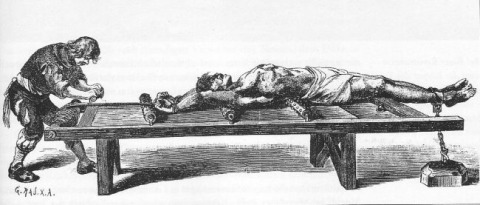
Query:
I believe that using torture as punishment is wrong, but I have difficulty pinpointing why. The argument I find strongest is that torture is wrong because it completely subverts the intellect and will, essentially reducing turning a human being into a nonrational animal. This makes sense, but let's say a criminal is convicted for a ghastly crime that essentially subverted the will and reason of his victim. Wouldn't he deserve that the same thing be done him?
Another argument is that torture must not be used for punishment because of what it does to the torturer. But one could easily think of some contraption or machine which carried out the punishment instead of a human being.
Reply:
Thanks for your letter. There is nothing wrong with either of the two arguments against torture that you mention. In terms of proportionality alone, it might at first appear that someone who vivisected should be vivisected, someone who raped should be raped, and so forth. However, intrinsically evil acts cannot be justified even if they are done for the sake of some good, such as retribution. The guiding principle, which is an axiom of both natural law and Scripture (Romans 3:8), is that we must never say “let us do evil so that good will come.”
And yes, not only would the person who committed an intrinsically evil act for the sake of retributive punishment be guilty of grave sin, he would distort himself inwardly by his deed, just like the person he is punishing. It would make no difference whatsoever – certainly not morally, and probably not even psychologically -- if the punisher used a contraption or machine to commit the evil acts, because the agent of the punishment would be him, not the machine, even if all he had to do was turn it on and watch it work.
If this were not so, then a person who murdered by using a gun would be able to say “I’m innocent, because I didn’t kill the fellow – the gun did!”